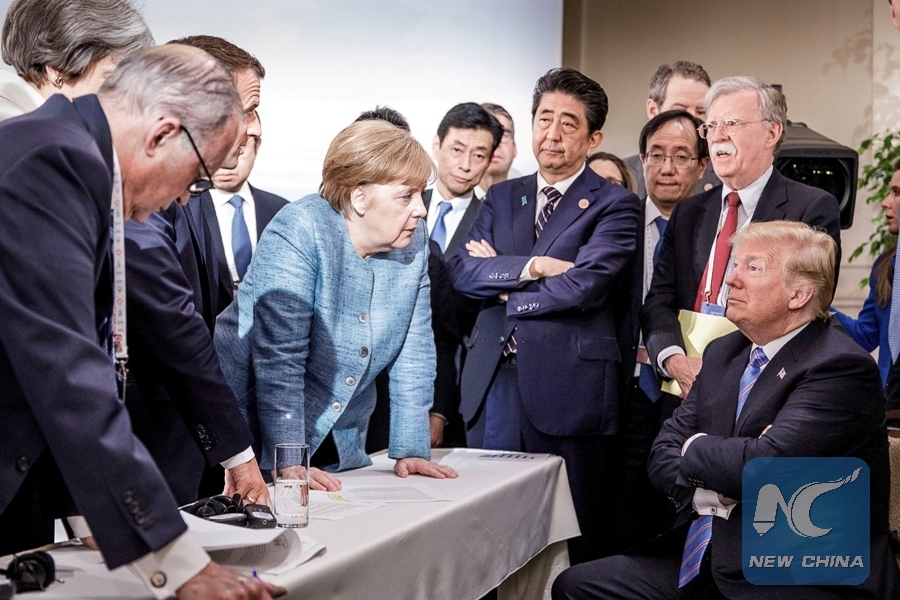
German Chancellor Angela Merkel speaks to U.S. President Donald Trump during the second day of the G7 meeting in Charlevoix city of La Malbaie, Quebec, Canada, June 9, 2018. (Bundesregierung/Jesco Denzel/Handout via REUTERS)
by Xinhua writers Xu Xingtang, Yang Shilong
NEW YORK, Aug. 15 (Xinhua) -- The U.S. tariffs battles with its major trading partners, if persistent, could dent the growth momentum of the world's largest economy whose economic fundamentals remain "worrisome", a renowned U.S. economist has warned.
"I think the case for a strong U.S. economy is very short term," Stephen Roach, former chairman of Morgan Stanley Asia and senior fellow at Yale University's Jackson Institute for Global Affairs, recently told Xinhua in an interview.
Roach expressed concern over the latest development of trade frictions between the United States and China, saying the deteriorating situation could not only disrupt their economies but the global economy as a whole.
DEFICIT STIMULATED GROWTH WON'T LAST LONG
The U.S. economy grew at an annual rate of 4.1 percent in the second quarter of the year, higher than the 2.2 percent in the previous quarter, according to the latest report by the U.S. Commerce Department.
"We clearly have a lot of support coming from the expansion of our federal budget deficits, which will provide further momentum over the next year in the United States," he said. "We continue to have unusually low interest rates and inflation adjusted terms, even though the Federal Reserve has started to move rates up, they're still below the inflation rate."
The White House slashed corporate and personal income taxes in January in a 1.5-trillion-U.S.-dollar package and the U.S. Congress passed a 1.3-trillion-U.S.-dollar spending bill in March.
"So our policies are providing a lot of artificial support in the United States. But the fundamentals I think are still worrisome," Roach said.
Middle-class American wages are "not increasing even though the unemployment rate is very low," he said, and Americans' chronic saving problem remains unresolved.
"If you add up the savings for individuals, businesses and the government sector, adjusted for depreciation, our net national savings rate is only about 3 percent of national income right now, which is less than half the average over the final three decades of the 20th century," he said.
"So lacking saving and wanting to grow, we import surplus savings from abroad. We run a big current account and multilateral trade deficits with lots of countries in addition to China. One wonders how sustainable that (growth) is on a longer term basis as well," he said.
U.S. economic growth will probably accelerate this year before slowing in 2019 to a 2.4 percent target as a fiscal stimulus fades, projected the nonpartisan Congressional Budget Office (CBO) in an updated economic outlook on Monday.
RISKY TO EXPAND TARIFFS BATTLE WITH MAJOR TRADING PARTNERS
Roach echoed many economists' view that rising trade barriers, as a result of the U.S.-initiated tariffs battle with its major trading partners, including China, the European Union (EU), Canada, Japan and South Korea, could put a damper on the growth of the U.S. economy as the fiscal stimulus of tax cuts fades soon.
The economist said it is wrong for the United States to think that this is the time to "take the risk to put pressure" on its trading partners to change policies, given the current strength and momentum of the U.S. economy.
In the case of the U.S.-China trade standoff, Roach said, the White House has threatened to increase the tariffs on up to 500 billion U.S. dollars of imported Chinese goods so as to "have more leverage" because China imports "a good deal less."
"That's, I think, an example of very poor analysis and a real misunderstanding of the role that the foreign trade and imports play in the U.S., to say that the deficit nation has the advantage over the surplus nation," he said.
"This goes back to the macro economic framework by which we have to look at trade deficits. When you don't save and you want to grow, you must import surplus savings from abroad, to support your economy. And that gives rise to balance of payments and multilateral trade deficits," Roach said.
The Whited House actually just revised up the U.S. savings statistics in a big, multi-year revision that was released in July, he noted. "But the savings rate is still low, you know, prior to the revision, it was estimated to be below 2 percent (of the national income), and now it's around 3."
"And so as we're continuing to put pressure on savings, these big budget deficits, the multilateral trade gap and the Chinese piece of that multilateral trade gap will continue to expand. That's the way the growth equation works for saving deficient economy like the United States," he said.
As domestic savings plunge, the United States has two options -- a reduction in investment and the economic growth it supports, or increased borrowing of surplus savings from abroad, according to Roach. Over the past 35 years, the United States has consistently opted for the latter, running balance-of-payments deficits every year since 1982 (with a minor exception in 1991, reflecting foreign contributions to U.S. military expenses in the Gulf War).
With these deficits come equally chronic trade deficits with a broad cross-section of U.S. foreign partners. In 2017, the United States ran trade deficits with 102 countries.

Stephen Roach, former chairman of Morgan Stanley Asia and senior fellow at Yale University's Jackson Institute for Global Affairs, speaks in an interview with Xinhua News Agency in Long Island, New York, the United States, on Aug. 9, 2018. (Xinhua/Zhang Mocheng)
TRADE DISPUTES COULD BE VERY DISRUPTIVE TO ECONOMY
It is "unfortunate" that trade disputes between the two largest economies in the world keep escalating, Roach said.
The 500 billion U.S. dollars of imports from China to the United States contain inputs and components from a whole lot of other countries around the world through supply chain linkages, he said. "And those imports hold down prices of goods for a large portion of American society and to tax those imports is taxing the consumers."
Trade with China allowed American families to save 850 dollars per household in 2015, a study by the U.S.-China Business Council shows.
"That's an aspect of economic vulnerability that is starting to become evident as prices are just now beginning to go up in response to these tariffs," he said. "And of course, China plays a critical role in lending surplus savings to the U.S. and buying Treasury securities, which help us fund very large and growing budget deficits in the United States."
"Potentially it could be very disruptive for the Chinese economy, for the U.S. economy and for the global economy," he said. "One hopes that reason will prevail and the escalation is limited, but I see no real evidence to suggest that's going to be the case at this point in time. So it's a worrisome development."
"I've argued that China and the United States should negotiate and sign a bilateral investment treaty, which would allow a broader investment via U.S. multinationals, for example, in Chinese counterparts. And the same is true with respect to China," he said.
"China, I think, will be the most dynamically growing domestic market in the world for the next 50 years. So other countries around the world can support their growth agendas by improving their presence in China. So it's good news that China is opening further. I think China has got to be more committed to that," he said.

